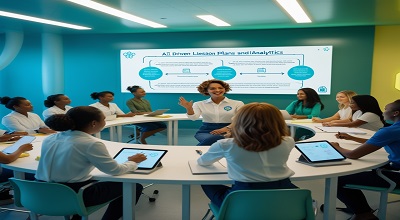AI in Teacher Training
AI in Teacher Training: Artificial Intelligence (AI) is revolutionizing education, and teacher training is no exception. With advancements in machine learning, natural language processing, and data analytics, AI is transforming how educators are trained, evaluated, and supported. This blog explores the latest trends, benefits, challenges, and future prospects of AI in teachers training.
At TeacherEducator.com, we are committed to keeping educators informed about cutting-edge technologies that enhance teaching effectiveness. Let’s dive into how AI is reshaping teacher training programs worldwide.
What is AI in Education?
AI in education refers to the use of intelligent algorithms and machine learning to enhance teaching and learning processes. It includes tools like adaptive learning platforms, automated grading systems, and virtual teaching assistants.
The Role of AI in Teacher Professional Development
AI supports teacher training by:
- Providing personalized learning pathways.
- Offering real-time feedback on teaching practices.
- Simulating classroom scenarios for practice.
Latest AI Innovations in Teacher Training
AI-Powered Personalized Learning for Teachers
AI analyzes a teacher’s strengths and weaknesses, recommending customized training modules. Platforms like Coursera and Udemy use AI to suggest courses based on individual progress.
Virtual Classrooms and Simulated Teaching Environments
AI-driven simulations (e.g., TeachLivE) allow teachers to practice in virtual classrooms with AI-generated student avatars, helping them refine classroom management and instructional strategies.
Automated Feedback and Assessment Tools
AI tools like Edthena provide instant feedback on teaching videos, analyzing speech patterns, student engagement, and lesson structure.
AI Chatbots for Teacher Support
Chatbots like IBM Watson Assistant help educators by answering FAQs, providing resources, and guiding them through professional development programs.
Benefits of AI in Teacher Training
Enhanced Personalization and Adaptive Learning
AI tailors training content to individual needs, ensuring teachers receive relevant and effective professional development.
Real-Time Feedback and Performance Analysis
Instead of waiting for supervisor evaluations, teachers get instant AI-driven insights into their teaching methods.
Scalability and Accessibility of Training Programs
AI makes high-quality teachers training accessible globally, reducing costs and logistical barriers.
Challenges and Ethical Considerations
Data Privacy and Security Concerns
AI systems collect vast amounts of data, raising concerns about how teacher and student information is stored and used.
Bias in AI Algorithms
If AI models are trained on biased data, they may reinforce inequalities in teacher evaluations.
Resistance to Technological Adoption
Some educators may be hesitant to rely on AI, preferring traditional training methods.
Future of AI in Teacher Training
Predictive Analytics for Teacher Success
AI will predict which teaching strategies lead to better student outcomes, helping educators refine their methods.
AI-Driven Mentorship Programs
Virtual mentors powered by AI will guide new teachers, offering advice and resources based on real-time classroom data.
Integration with Augmented and Virtual Reality
AR/VR will create immersive training experiences, allowing teachers to practice in hyper-realistic environments.
Case Studies: AI in Action
How Universities Are Using AI for Teacher Preparation
- University of Southern California (USC) uses AI simulations to train future educators.
- Harvard Graduate School of Education employs AI-driven analytics to improve teaching strategies.
AI Tools Adopted by School Districts
- New York City Department of Education uses AI for teacher coaching and feedback.
- Singapore’s Ministry of Education integrates AI into national teacher trainings programs.
Conclusion
AI is transforming teacher training by making it more personalized, efficient, and scalable. While challenges like data privacy and bias remain, the potential benefits are immense. As AI continues to evolve, educators must embrace these innovations to enhance their professional growth and improve student learning outcomes.
Free Here: SVIP APK
